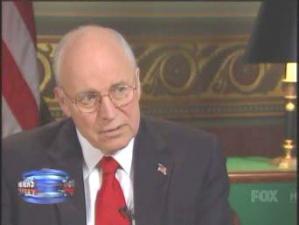Dick Cheney goes on his favorite network, FOX, to close out his career. There's nothing to be gained going on Meet the Press since there aren't any talking points needed to be pushed on the American people, like starting an illegal war and all so Wallace gets the interview. And as always his hubris is shocking. Cheney and his Band of Neocons lied this country into a war with Iraq as they created Bush's Doctrine. (Preemptive war.)
And he sits there with the rest of BushCO., trying to create a new narrative to cover their tracks about the war. It's the fault of "The Intelligence". I can see Stewart now talking to a big floppy-eared College Football mascot named Intelligence and asking him why he f*&ked up Cheney. Dick created the intelligence that was used to bring us to war.
WALLACE: What do you think are the powers of the president relative to Congress and the courts during the war?
CHENEY: I think they're very significant, and I think they have to be. And I think there's ample precedent for that. I mean, the fact of the matter is that, especially given the kind of conflict we're faced with today, we find ourselves in a situation where I believe you need strong executive leadership.
What we did in this administration is to exert that kind of authority. We did it in a manner that I believe and the lawyers that we looked to for advice believed was fully consistent with the Constitution and with the laws of the land. And there's, I say, ample precedent for it.
WALLACE: If you could conceptualize it for me, sir, what do you think are the powers of the president relative to Congress and relative to the courts during war?
CHENEY: Well, I think in wartime, when you consider his responsibilities as commander in chief, clearly that means command of the armed forces.
It also, when you get into use of forces in wartime, means collecting intelligence. And therefore, I think you're fully justified in setting up a terror surveillance program to be able to intercept the communications of people who are communicating with terrorists outside the United States.
I think you can have a robust interrogation program with respect to high-value detainees. Now, those are all steps we took that I believe the president was fully authorized in taking and provided invaluable intelligence which has been the key to our ability to defeat Al Qaida over these last seven years.
WALLACE: This is at the core of the controversies that I want to get to with you in a moment. If the president during war decides to do something to protect the country, is it legal?
CHENEY: General proposition, I'd say yes. You need to be more specific than that. I mean — but clearly, when you take the oath of office on January 20th of 2001, as we did, you take the oath to support and defend and protect the Constitution of the United States against all enemies, foreign and domestic.
There's no question about what your responsibilities are in that regard. And again, I think that there are bound to be debates and arguments from time to time, and wrestling back and forth, about what kind of authority is appropriate in any specific circumstance.
But I think that what we've done has been totally consistent with what the Constitution provides for.
Rendition, torture, warrantless wiretapping, attacking countries that didn't attack us. Yes, he has made the Constitution proud.
As Think Progress points out: Cheney Echoes Nixon
Cheney’s answer is eerily reminiscent of former President Richard Nixon’s claim that “when the president does it, that means that it is not illegal.” Nixon made the comment in his famous interview with David Frost, responding to a question about whether “there are certain situations” in which “the president can decide that it’s in the best interests of the nation or something, and do something illegal.”
I wish he could have been frogmarched out of FOX's studios along with Roger Ailes as a co-conspirator. We know about that stuff because of Fitzgerald and he refused to comment about Fitz.
WALLACE: Let's talk about prosecutor Patrick Fitzgerald.
CHENEY: I'm going to pass on that.
WALLACE: What about the criticism that in the Blagojevich case, as in the Libby case, he doesn't just stay within the four corners of the
indictment, but he makes political comments?
CHENEY: I'm going to pass on that.












